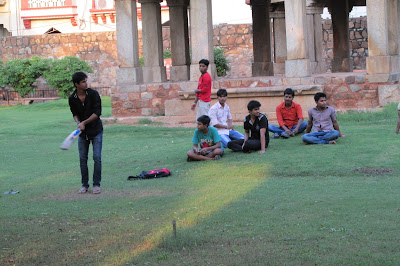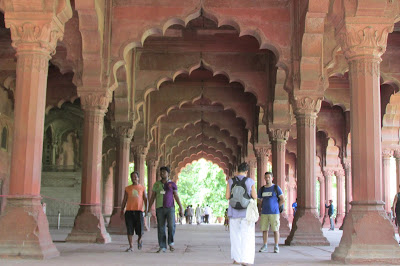"Merry decided that if there was no school for Neeraj, she’d simply have to build one." - Roy Grinker
--
It was hot, really hot.
And not hot like, “Oh, the sun is beating down on me, I need
to put some sun screen on” at the beach hot.
No, not like that at all…
Outside, the sky was full of gray clouds, the same damn
clouds that have been here since I arrived.
Just sitting there, holding moisture, creating humidity, and mocking me
from above as I sweat my ocean-breeze loving California boy ass off.
I’m in a small conference room with about 25 people, each
feeling the heat as harshly as I. The
electricity had just gone out, and with it the fans that were our only savior
from the monsoon season lurking outside.
I look down at my lunch, which composed of some form of pita
like bread, some random pickled vegetables, and a vegetarian pile of yellow
mush, all which had been purchased for a mere 30 rupees (about 50 cents).
Sweat dripping down my face and hoping I’m not about to get
sick, I couldn’t be more excited to be there.
--
As I took a bite of the mush combined with the pitaesque
bread, an amalgamate of spice hits my palate and immediately transforms into
easily the best vegetarian main dish I’ve ever eaten.
I look over at the wall to see a huge poster with the
manifest for “Action for Autism” (AFA), the leading organization for autism
research and treatment in a country of 1 billion people. On it are a list of the rights the
organization feels individuals with autism are entitled to, as well as what
appear to be signatures from researchers, teachers, parents, and children. I speak candidly with several others in the
room about my background, and am soon introduced by the center’s head
researcher to the full staff which comprises research staff, occupational
therapists, teachers, and teacher assistants.
Then, everybody ate family style. Indian style potato salad (aka five-spice
potatoes), a sweet and tart style yogurt, and my favorite besides my yellow
mush: ‘lady fingers’ which were thin green peppers dipped in some type of other
orange mush. Even with the heat,
everyone is gregarious and upbeat, simply trying to enjoy their short lunch break
before getting back to the work they love.
I meet the woman who started AFA, a kind, but assertive lady
by the name of Merry. Her story is
amazing to say the least. I first read
about it in Dr. Roy Grinker’s novel, Unstrange
Minds, a novel I’ve gone on to recommend to family, friends, and other
people in the field. It chronicles Grinker’s
travels throughout the world to see how different cultures and societies view
and tackle the issue of autism. Grinker
is an anthropologist at George Washington University in Washington D.C. and
became interested in autism when his daughter, Isabella, was diagnosed several
decades ago. I actually had the
opportunity to meet him last year and lead a class discussion after he came to
talk about his work in South Korea. Needless
to say, he’s one of my biggest research influences.
But back to Merry.
Grinker spends the better part of two chapters talking about Merry and
her contributions to autism awareness and treatment in India. Her son, Neeraj, was diagnosed with autism in the mid-80s, and like any good mother, wished and wanted the best for him. However, as in many other parts of the world at the time, there was little help and education on the matter. So, she took matters into her own hands and created and molded AFA into what it is today.
Here is an excerpt from the book where
Grinker describes his first encounters with Merry. I thought about including more, but want to
encourage everyone reading to spend the $10 for the book and get the rest of
the story.
--
It’s 9 A.M. on a
Monday morning in January 2005, south Delhi, India, and my taxi driver, having
stopped three times to ask passersby for directions, looks as if he’s about to
give up. He’s taken me to the right neighborhood, Sheik Serai Phase 2, but it’s
a run-down area with few landmarks, and stray cows walking the streets. It’s
bigger than I thought it would be, and I don’t have an actual address. “The
place is called ‘Action for Autism,’” I tell him, “just above Mahavira
Chemist,” but he says he doesn’t know this word “autism” and suggests we go
back to my hotel. Ten minutes later, I’m the one who finds it, a small white
banner hanging from the third floor of a
crumbling building in a Delhi slum, that said “Action for Autism, Open Door.”
I’m carrying a large,
heavy box from IKEA. Before I left the United States, I had asked the director,
Merry Barua, if there was anything I could bring her, and she had sent back an
enigmatic e-mail reply, “igloos.” At first I thought it was a joke that I just
didn’t get, but I decided to e-mail back for clarification. There was no reply.
Was it a cooler she wanted? Was this a sarcastic joke about refrigerator
mothers?* Maybe the igloo was a metaphor for India’s failure to provide an
appropriate place for autistic children, a symbol of autism’s alien character.
But then, knowing how much children with autism like to hide in tents and
cupboards, Joyce suggested I go to IKEA in College Park, Maryland, where, to my
utter surprise, they sold small, white, dome-shaped tents designed to look like
igloos. When I got to Delhi, Merry would
say flatly, as if she knew they were coming all along, “Oh good, you found
igloos.”
To get to the offices
of Action for Autism, I go up three flights of dark stairs, past barely visible
wall paintings of sea life, to a cold, crumbling group of dusty classrooms and
a tiny central office where the director and her staff work cheek by jowl. One
level higher, the teachers watch a dozen students play for a while before
dividing them up into four small classrooms. Everyone is coughing and rubbing
their eyes this morning, the result of a combination of the weekend’s
accumulation of dust and the fumes of masala being fried downstairs. This seems
like an unlikely place to find the person who knows more about autism than
anyone else in New Delhi, a city of 14 million people, and the capital of India
(pop. 1.1 billion).
The founder and
director of Action for Autism has no advanced degrees and no special training
in child development. In a status-conscious country like India, she can’t even
get invited to speak at scientific conferences. But Merry Barua has arguably
done more to increase autism awareness than anyone else in India. Small and
thin, with black hair, cut short but tousled in a stylish way, Merry looks most
comfortable with herself when she’s wearing blue jeans and eating Domino’s
pizza. In her tiny office suite, she’s totally in control, but she gives her
assistants responsibility and decision-making powers. She darts from place to
place but never seems intrusive. One moment she’s caffeinated, multitasking,
all at once on the phone, proofreading a hard copy of a grant proposal, and, if
the electricity and phone lines are working, looking for something on the
Internet; the next moment, she is sitting quietly with a distraught mother who
wonders if there is any place on earth for her son, a mother who, at least for
that moment, feels she is Merry’s only concern.
- Grinker, Roy Richard (2008-08-05). Unstrange Minds.
--
Lunch ends, and everybody goes back to their respective
areas to continue to work with both kids and adults on the autism
spectrum. AFA has expanded quite a bit
since Grinker’s novel, and now resides in a several story brick building in a
small neighborhood of Delhi. They
continue to be India’s pioneers in research, treatment, treatment dissemination
(incredibly important!!), and awareness.
While this is amazing, and AFA as an organization is
incredible in all it does, I can’t help but be shaken by the fact that this resource
is one of the very few that all of India has… a nation that is estimated to have
as many as 430,000 children with autism.**
Fuck.
--
Footnotes:
*The term “Refrigerator Mothers” refers to what
“professionals” initially considered the cause of autism, which was a lack of
love from parents, primarily the mother.
These “professionals” used this term for “cold” mothers who were
supposedly causing the symptoms of a child with autism. Dumbasses.
**Calculated through population records and current CDC
estimates of autism prevalence
























